
Joust is an action game developed by Williams Electronics and released in arcades in 1982. While not the first two-player cooperative video game, Joust's success and polished implementation popularized the concept. Player 1 rides an ostrich, player 2 a stork. Repeatedly pressing the flap button gains altitude, while a two-directional joystick controls direction. In a collision with enemy knights riding buzzards—or the other player—the higher rider dismounts the other.
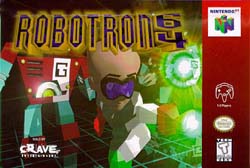
Robotron 64 is a 1998 multidirectional shooter for the Nintendo 64. It is a port of Robotron X, which itself is an updated version of the 1982 dual-stick shooter Robotron: 2084. The game was originally scheduled to be released by Midway Games in the summer of 1997, but the game was put on hiatus before it would see a new publisher and a release date of January 5, 1998.
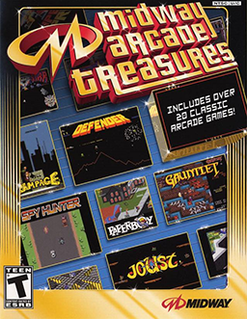
Midway Arcade Treasures is a video-game compilation of 24 arcade games, emulated from the original PCBs. The overall release was developed by Digital Eclipse and issued by Midway Games for the PlayStation 2, Xbox, GameCube, and Microsoft Windows.

Rampage World Tour is a video game released in 1997 and is the second game in the Rampage series. The game was developed as an arcade game for Midway Games by Game Refuge Inc. designers Brian Colin and Jeff Nauman, who conceived and designed the original in 1986. It was ported to the Sega Saturn, Nintendo 64, Game Boy Color, PlayStation, Microsoft Windows and has been re-released on Midway Arcade Treasures 2 as well as being included in Rampage: Total Destruction.
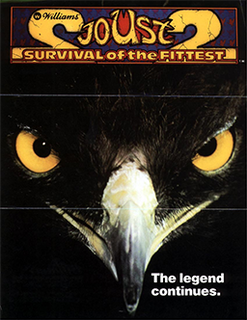
Joust 2: Survival of the Fittest is an arcade game developed by Williams Electronics and released in 1986. It is a sequel to Williams' 1982 game Joust. Like its predecessor, Joust 2 is a 2D aerial combat game with platforms to land on. The player uses a button and joystick to control a knight riding a flying ostrich. The object is to progress through levels by defeating groups of enemy knights riding buzzards. Joust 2 features improved audio-visuals and new features such as mutant buzzards created by eggs falling into lava, the ability to transform from an ostrich to a flying horse, and differently themed levels. Waves no longer seamlessly flow into each other; the gameplay is divided into separate screens with transitions between them.
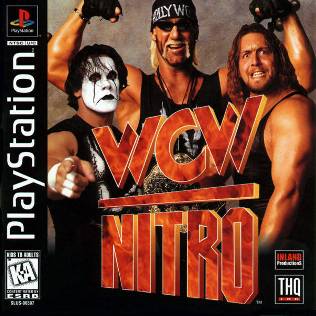
WCW Nitro is a professional wrestling video game based on the professional wrestling television show of the same name. Released by THQ for the PlayStation game console in 1998, the game featured a large roster of playable WCW wrestlers as well as full motion video clips of the television show. The game was followed by WCW/nWo Thunder, which was based on Nitro's Thursday night counterpart. Ports for Nintendo 64 and Microsoft Windows were released later in 1998 and 1999 with the updated roster featured in Thunder.

2 On 2 Open Ice Challenge, also known as NHL Open Ice: 2 on 2 Challenge, or just NHL Open Ice, is an ice hockey arcade game released by Midway Games in 1995. It features comically exaggerated hockey play, causing it to often be described as an ice hockey equivalent to Midway's NBA Jam. It was ported to PlayStation in 1996. The game would be similar to its arcade counterpart with exception to the fact that the Winnipeg Jets moved to Phoenix after the conclusion of the 1995–96 season, thus the Phoenix Coyotes replaced the Jets in the PlayStation port. In addition, much of the team's roster was changed, including its goalie, Tim Cheveldae being replaced by Nikolai Khabibulin, therefore Cheveldae was unable to be a goalie playing for any team in the PlayStation version.

Midway's Greatest Arcade Hits is an arcade game compilation released for the Nintendo 64, Dreamcast, and Game Boy Advance.

Wayne Gretzky's 3D Hockey '98 is an ice hockey game for the Nintendo 64 and PlayStation, released in 1997. The game is endorsed by hockey star Wayne Gretzky, and is the sequel to Wayne Gretzky's 3D Hockey.

Midway Arcade Treasures: Extended Play is a video game compilation of 21 classic Midway, Atari and Williams arcade games released in 2005 for the PlayStation Portable. Midway Arcade Treasures: Extended Play was re-released for the PlayStation Store on June 28, 2010 by Warner Bros. Interactive Entertainment due to Midway's bankruptcy, also meaning that Warner Bros. owns rights to most of the Midway, Atari and Williams arcade library after the purchase of some assets of Midway Games.

Arcade's Greatest Hits: The Atari Collection 1 is a compilation of Atari arcade games for the Sega Saturn, PlayStation, and Super Nintendo Entertainment System. It is a successor volume to Williams Arcade's Greatest Hits. Most of these games fall into the action game category. The Saturn and PlayStation versions of the game include an FMV documentary on the "Golden Age of Atari", featuring video interviews with the programmers behind the six games in the compilation. The later Super NES version was announced by Midway as their final release for any "16-bit" console.

Williams Arcade's Greatest Hits is a video game anthology for the Super NES, PlayStation, Sega Genesis, Sega Saturn, Game.com, and Dreamcast game consoles. It was also released for DOS and Windows.
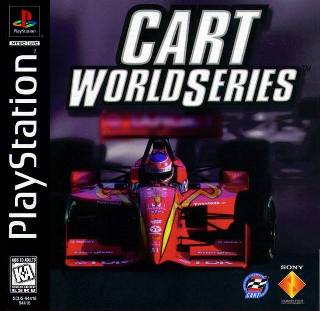
CART World Series is a racing video game for the PlayStation console, developed by Sony Interactive Studios America and published by Sony Computer Entertainment and released in October 1997. CART World Series is based on the Championship Auto Racing Teams (CART) open-wheel racing series.

MLB ‘98 is a Major League Baseball video game for the PlayStation developed by Sony Interactive Studios America and released in August 1997. It precedes MLB '99 and is the sequel to MLB Pennant Race.

San Francisco Rush: Extreme Racing is a video game developed and published by Atari Games. This game was first released in arcades in 1996 and was ported to Nintendo 64 in 1997 and the PlayStation in 1998. San Francisco Rush: Extreme Racing is the first game in the Rush series.

Micro Machines V3 is a racing video game developed by Codemasters and Novalicious for PlayStation, Microsoft Windows, Nintendo 64, and Game Boy Color.

NHL FaceOff 98 is a video game developed by Killer Game and published by Sony Computer Entertainment of America for the PlayStation. It's part of the NHL FaceOff series, and was the first installment to use polygonal players. The music was done by Tommy Tallarico.

NBA Fastbreak '98 is a basketball simulator released for the Sony PlayStation in 1997. It takes place during the 1997-98 National Basketball Association season. It was published by Midway Games and GT Interactive. Originally announced under the title "Hardwood Heroes", the game was released with minimal changes as NBA Action 98 on Sega Saturn and Microsoft Windows, published by Sega. Another version was being developed by Z-Axis for the Nintendo 64 under the title "NBA Fast Break 64", with a prospective November 1997 release, but it was cancelled.
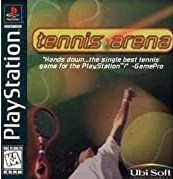
Tennis Arena is a video game developed by British studio Smart Dog and published by Ubi Soft for the PlayStation and Sega Saturn in 1997-1998. The Saturn version was released only in Japan.

NHL Powerplay 98 is a sports video game developed by Radical Entertainment and published by Virgin Interactive and Sega for Microsoft Windows, PlayStation, and Sega Saturn in 1997. It is the sequel to NHL Powerplay '96; there was no "'97" entry in the NHL Powerplay series. After Virgin opted not to release the game for the Sega Saturn, Sega acquired the rights and published the Saturn version under the title NHL All-Star Hockey 98 so as to make it a continuation of Sega's own NHL All-Star Hockey series.




















